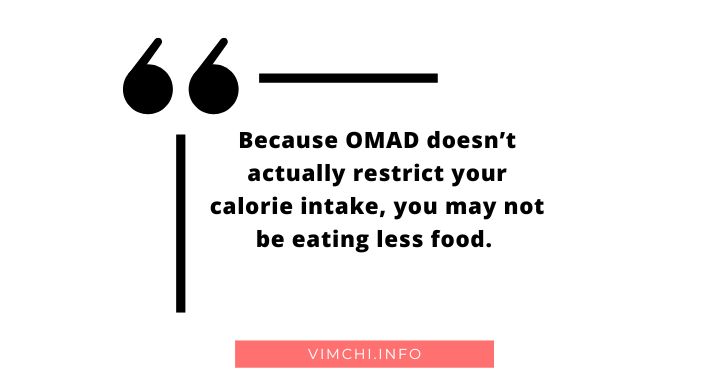
OMAD is one of the eating plans that you might want to try if you are not losing weight after you have attempted other diet plans. However, every time I talk about OMAD with my friends who are health professionals, they immediately ask about how it will affect their metabolism. “Will OMAD slow my metabolism?”
Will it? Does eating once a day mess up your metabolism?
Read: What food to avoid when on OMAD?
Will OMAD Slow My Metabolism?
It depends on who you ask. If it is your doctor or a dietitian, then he/she will say that it will, indeed, slow down your metabolism.
According to this animal study, eating one meal a day worsen the health of the mice. The study stated that the mice that consumed one meal a day experienced an increase in their body weight, fat, and insulin.
The researchers of the study concluded that OMAD could impact the genes that regulate the body clock and metabolism.
Another study also found that people who practiced intermittent fasting experienced high LDL or bad cholesterol. This type of cholesterol could increase the risk of heart disease, stroke, and high blood pressure.
However, the study is still limited. People who did follow OMAD claimed that this eating plan helped them in boosting their metabolism.
After all, metabolism is your body’s ability to convert the food that you eat into energy through chemical reactions. Thus, the caloric restriction won’t affect or damage the effectiveness of how your body converts and use the nutrients in your food.
Weight loss reduces metabolic rate. It does not matter if it is the result of fasting or counting calories.
However, if you have a reduced metabolic rate, it does not necessarily mean that your metabolism got slower or damaged. It only means that it uses fewer calories.
Read: Meal Plan Ideas When Intermittent Fasting
Will OMAD Mess Up Your Metabolism?
It may not ruin your metabolism. Your body is flexible. It can adapt well to your calorie restriction. It means that whatever changes you do, it can accommodate them and reorganize them to fit into the new norm.
Our body is designed to adapt dynamically. It is known as metabolic adaptation.
When you eat more but you also move more, your body uses more fuel. But when you eat less, your body also uses less fuel.
This is the reason large people burn more calories because they have more energy to use. As you lose weight, your energy use declines.
Losing weight is a dynamic process. It means that if you lose weight, you will also start to use less energy. You will burn fewer calories when you are losing weight.
When you weigh less, your body will also use less energy. But it does not necessarily mean that your metabolism is getting slower.
If you have a lot of weight, your body will have to work hard to help you move around. The process will cost more fuel. But when you reduce your extra weight, you will not need more energy.
It is the same when you have a loaded car. It burns more fuel compared to when it is empty. If you drive and you’re the only passenger, your car will burn less fuel compared to having extra people in the car.
But when you reduce your load, your car will start to adjust and burn less fuel.
Load reduction does affect the efficiency of the engine in burning fuel.
Read: Easy Meal Ideas
Does Eating One Meal a Day Bad for Metabolism?

It is not bad for your metabolism. Because OMAD doesn’t actually restrict your calorie intake, you may not be eating less food.
However, it is not advisable to just eat anything that you want. You can still gain weight if you eat more than your recommended daily calorie intake to lose weight.
How Does OMAD Help You Lose Weight?
The main goal of this diet is to force your body to use your body fat for fuel, instead of carbs. This eating plan manipulates your body to find and use fuel differently.
Each time you eat, your body uses the food that you eat for energy. When you take in carbs, your body will convert them into sugar, eventually, to fuel.
If you take more sugar than your body needs, the insulin in your body will carry the extra carb into your fat cells.
However, if you don’t consume anything for extended periods, your body will produce less insulin. Instead, your body will stimulate your fat cells to release energy to compensate for the lack of sugar.
For your body to use stored fat for fuel, you have to avoid eating for a long period until your insulin drops.
However, this eating plan is not a magic bullet. As mentioned, you can still gain weight even if you eat one meal a day. It is especially true if you do eat more than what your body burns.
For instance, if you only need 1,500 calories a day but if your OMAD meal is 2,000 calories and you eat it all, you can still gain weight.
But some people still lose weight on OMAD even without calorie restrictions.
This is not surprising considering that every person’s body is different. Your body may adapt well to OMAD and you will lose weight significantly with this eating plan.
Others may not lose weight with OMAD. I have a friend who followed OMAD but ate a lot of cookies and sweets during his one meal.
As a result, he did not lose weight with OMAD. But he did not gain weight either.
That’s why OMAD is not for everyone. You may try it for one month and find out if it does help you lose weight.
Make sure that you eat healthy food, instead of sweets and food loaded with carbs.
If you are struggling to prepare your OMAD meals, you may check out this list.
You may also pair OMAD with keto. That is, your one meal a day will be high in healthy fats, moderate protein, and low in carbs.
OMAD to Lose Weight
If it is difficult for you to lose weight, you may want to try eating one meal a day. Will OMAD slow my metabolism? It will not slow down your metabolism. If you wish OMAD to work for your weight loss goal, read our tricks here.
Speak Now ... Or Forever Hold Your Peace